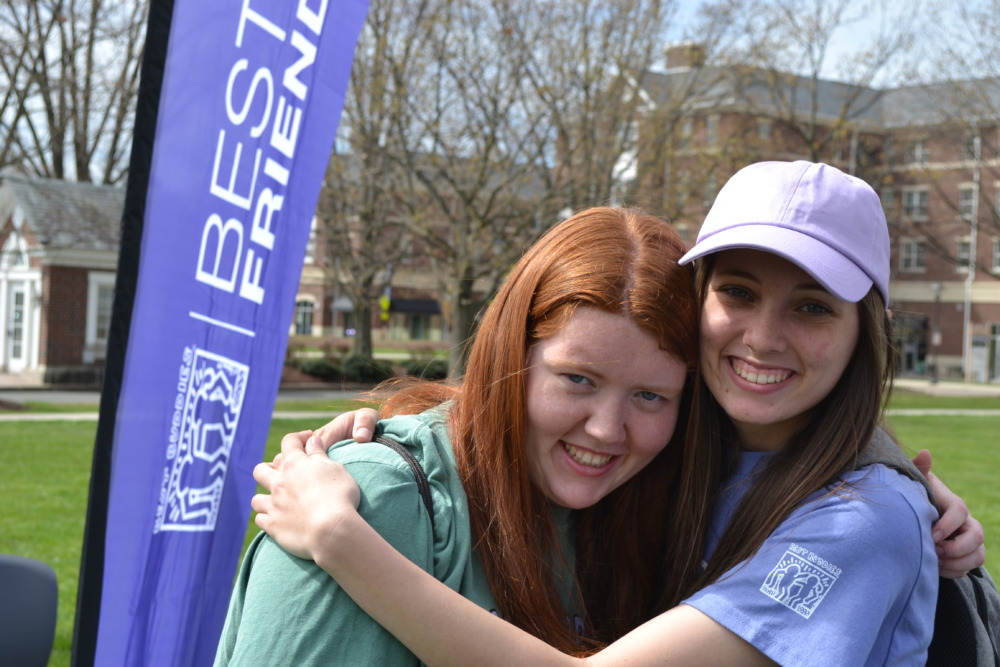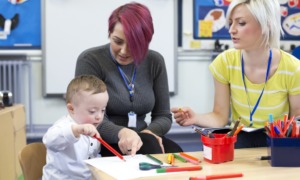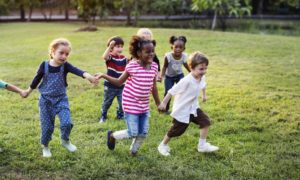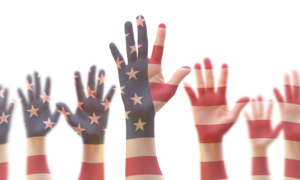After a year of remote learning and seeing each other online only, Elizabeth Mancini and Kelsey Heaney were glad to set foot on campus at The College of New Jersey last fall.
“I spotted Kelsey and started running towards her,” Mancini said. “She saw me and ran towards me. We gave each other the biggest hug.”
The college sophomores still hang out together as they nurture a friendship begun through Best Buddies, an international nonprofit that pairs students without learning disabilities with students with intellectual and/or developmental disabilities. Those pairings are in keeping with the organization goal of stemming social isolation often felt by disabled students and to integrate them more fully into society.
 “We weren’t close when we first met. I blame it on Zoom,” Heaney said, noting the constraints imposed by a year of online-only Best Buddies meetings.
“We weren’t close when we first met. I blame it on Zoom,” Heaney said, noting the constraints imposed by a year of online-only Best Buddies meetings.
With COVID-19 restrictions eased, Mancini said, “We spend more time together when we meet in person … We can focus on one another when we’re together, not on the computer.”
Heaney, whose traumatic brain injury results from a childhood operation that went awry, is in the career and community studies program at the college. That four-year certificate program for 18- through 25-year-old students with learning disabilities aims to prepare them for careers after college; live independently; and socialize more easily with their peers and others.
Mancini, a special education major seeking to become a classroom teacher, heard about Best Buddies from a former high school teacher. “It sounded like a good way to make friends,” she said, “and increase my awareness of people who I may not have had the opportunity to connect with. Best Buddies is about inclusion. And without this program, I would have missed out on connecting with people I care deeply about.”
At The College of New Jersey, Best Buddies meets every other Wednesday. Events include karaoke, ice cream socials, movie nights and a recent tie-dye shirt party. “That was my favorite so far,” Heaney said.
Ice cream socials, dances, charity-fundraiser walks and other activities take place at Best Buddies’ chapters around the globe. Founded in 1989 at Georgetown University by Georgetown student Anthony Kennedy Shriver, the nonprofit’s current CEO and chairman, Best Buddies has more than 1.3 million participants in its 3,000 chapters; chapters are in each of the 50 United States. In the nation’s Capitol and Miami, Best Buddies operates residences for people with and without disabilities.
“The unprecedented challenges we faced together in 2020 has highlighted just how important our mission of inclusion is for individuals with intellectual and developmental disabilities,” Kennedy Shriver said. “They need us now, more than ever.”
Reciprocity and mutual benefits
Mancini was the first college classmate Heaney met who wasn’t in her four-certificate program for learning disabled students. “I had ‘friends,’ in high school,” Heaney said, punctuating her point with air quotes. “I just couldn’t count on them. It’s not like the friends I have now. Elizabeth listens to me and is there for me.”
And Heaney was Mancini’s first friend on campus. They talk about sports, movies, their family and friends and school. They both play on the school’s soccer and basketball teams. “We’re part of a large community,” Mancini said. “It’s nice to have a buddy I’m close with.”
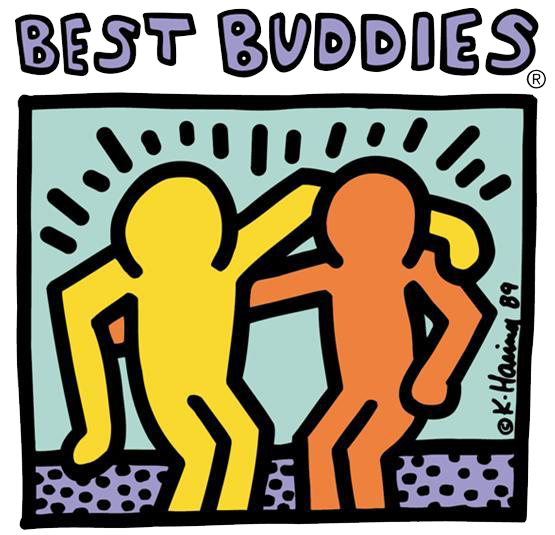 Students involved in the Best Buddies’ program stay together from freshman through senior year. “Many of the students remain friends long after college,” said Daphne Stanfield, president of The College of New Jersey chapter of Best Buddies, noting that there are chapters in 522 middle schools, 1,389 high schools and 512 colleges across the United States.
Students involved in the Best Buddies’ program stay together from freshman through senior year. “Many of the students remain friends long after college,” said Daphne Stanfield, president of The College of New Jersey chapter of Best Buddies, noting that there are chapters in 522 middle schools, 1,389 high schools and 512 colleges across the United States.
Mancini and Heaney said they’re headed for a long-range friendship. Residents of New Jersey, they live about 90 minutes from one another by car. Mancini drives so the duo can go to the mall, to local restaurants and to one another’s home. “I’ve learned that, despite our different abilities,” Mancini said, “we share so much.”
“Yes,” said Heaney. “This relationship had taught me not everyone is that different from each other. The world should be Best Buddies on a bigger scale.”
New Jerseyites Jess Lazar and Colleen Bryan, juniors on the same campus, also are interested in careers in special education. Laughter, among other shared gifts, are among what they most treasure about their friendship.
“She gives me sass and I give it right back to her,” Lazar added.
They can be found dining together at the school cafeteria. “And now that Jess has a car,” Bryan said, “we can do things off campus together, like catch a movie or go to an off-campus restaurant.”
Inclusion as an end-game goal
“While we don’t focus on my disability, I don’t mind talking about it.”” added Bryan, who has DiGeorge syndrome, a genetic disease that can cause heart defects; hooded eyelids, flattened cheeks and other facial differences; immune disorders; and developmental delays.
“Colleen challenges me to be the best version of myself,” Lazar said.
“And she does the same for me,” Bryan added.
They talk almost daily. “Our relationship is supportive and uplifting,” Lazar said.
And Lazar, Bryan said, is helping her hone some needed people skills: “I didn’t know how to keep the friendships I made. In middle and high school, friends would disappear. Now, in college, I have Jess, a good support system and other good friends. I’ve learned to see people’s true colors and understand who’s a true friend.”
She continued: “If I’m having a situation with another peer, Jess helps me figure out what I need to do. She helps me understand what I did wrong and how to fix it.”
After earning her bachelor’s degree, Lazar plans to spend an extra year at The College of New Jersey getting a master’s in special education. Bryan hopes to become a special education assistant teaching others about disabilities.
“We learn so much from each other,” Lazar said. “And she’s the craftiest person I know. She can crochet anything: bags, jewelry and more. She’s also the photographer at our Best Buddies Ball and other social events.”
“Best Buddies is all about friendship and inclusion,” said Stanfield, The College of New Jersey Best Buddies chapter leader. The special education major sees Best Buddies as a way to celebrate people with and without different abilities. “Everyone benefits from these relationships,” she said. “What’s especially nice is these relationships last well after college.”
Stanfield’s buddy is Lily Bohon, a senior with Down syndrome who loves eating out as often as possible. “We often dine together,” she said. “I also love listening to her sing, which she does during karaoke nights.”


